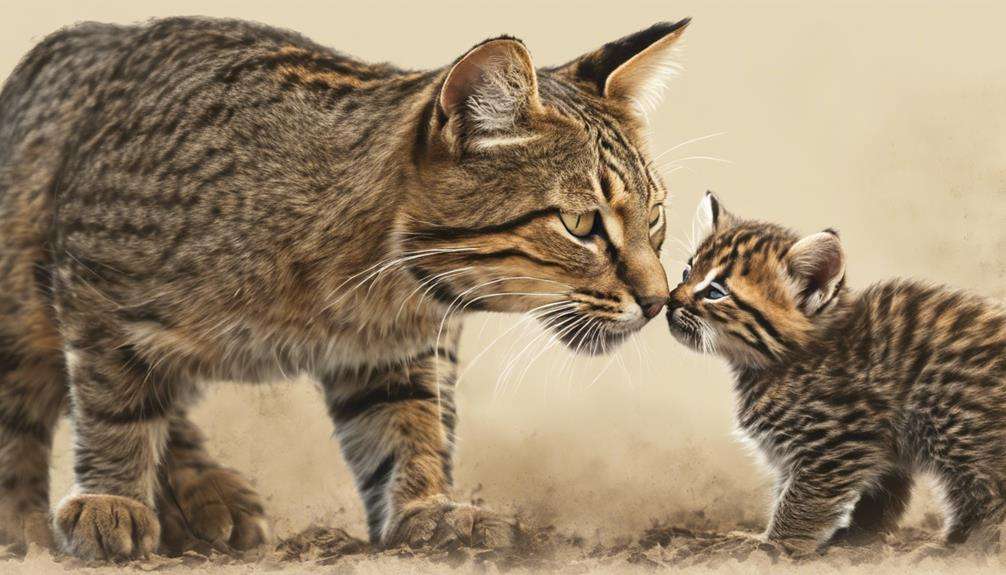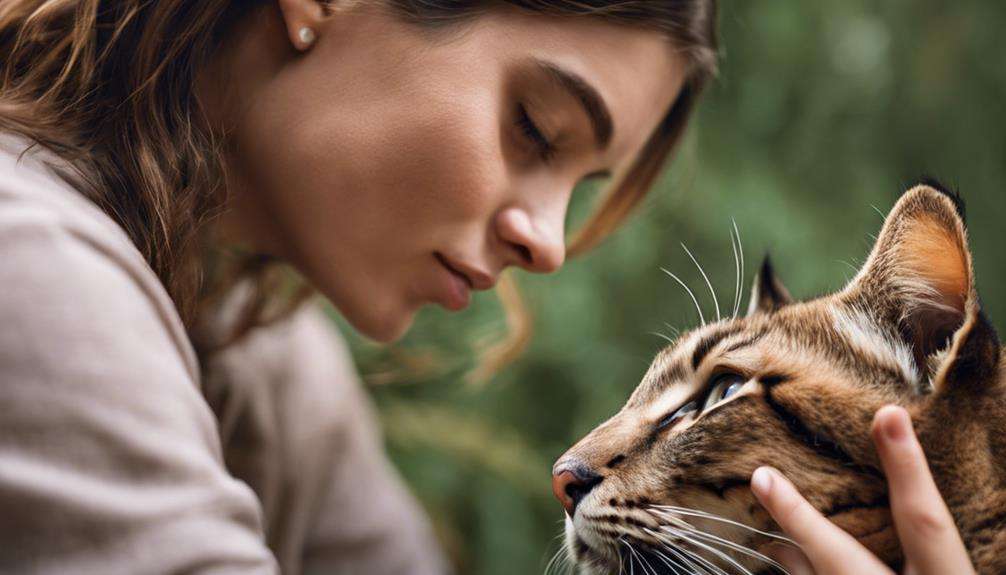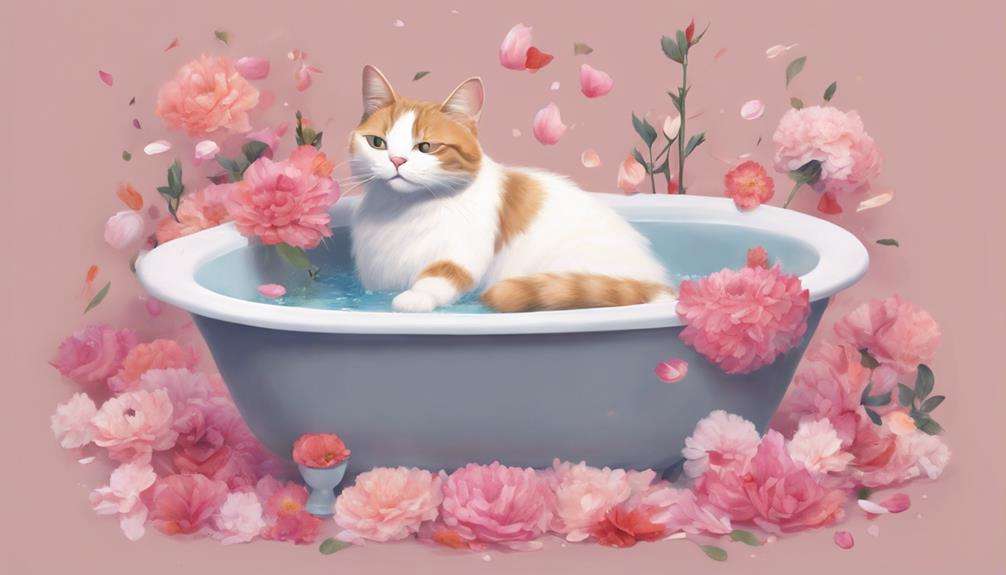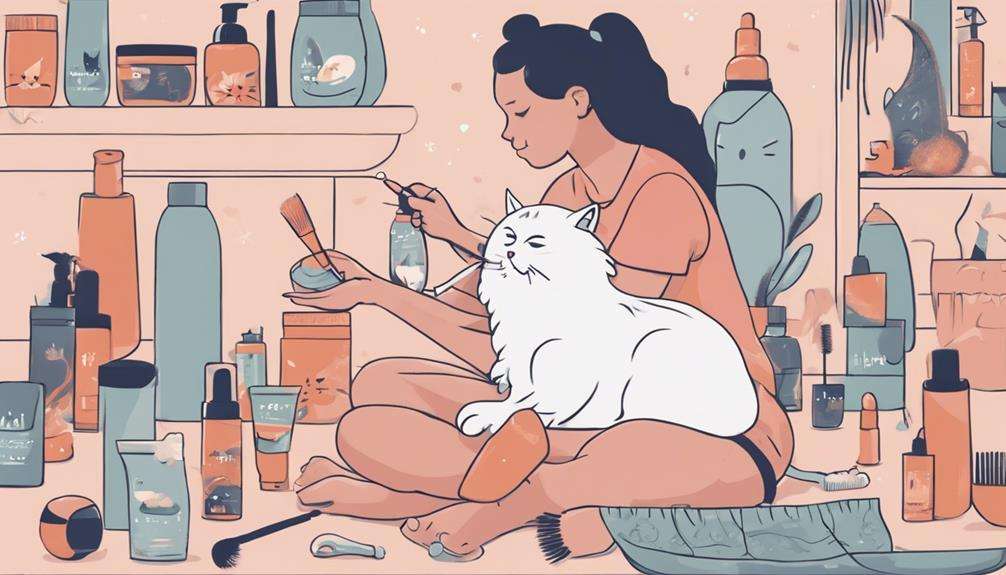Have you ever wondered what it truly takes to provide expert care for exotic felines like ocelots and servals? Understanding the intricacies of their unique dietary requirements and ensuring a safe environment is just the beginning.
As you navigate the world of wild cat care, you'll soon realize the critical role that knowledge and dedication play in fostering the health and happiness of these majestic creatures. But what specific guidelines and practices are essential for ensuring their well-being?
Stay tuned to uncover the expert insights that will help you navigate the world of exotic feline care with confidence and competence.
Key Takeaways
- Specialized veterinary care and precise nutrition vital for exotic feline health.
- Gradual weaning process with focus on healthy eating habits and independence.
- Provide safe, enriched habitats with proper ventilation and safety measures.
- Regular preventive care, balanced diets, and feeding schedules crucial for exotic felines.
Hand-Raising Big Exotic Cats
When hand-raising big exotic cats such as tigers and ocelots, understanding the reasons and challenges involved is crucial for their successful care and development. As exotic pets, these animals require specialized veterinary care, particularly in their early stages of life. Nutritional needs must be met through precise formulas to mimic their mother's milk. Hand-raising these majestic felines demands dedication and knowledge of their special care requirements.
Veterinarian Ron Hines, with a PhD, emphasizes the importance of establishing trust and meeting the unique needs of hand-raised big exotic cats. This involves meticulous attention to detail in their diet, health, and overall well-being. Reasons for hand-raising these cats range from maternal neglect to ensuring the survival of large litters or addressing poor mothering instincts. Challenges include developmental differences and potential issues with maternal care in subsequent generations, highlighting the delicate balance required in nurturing these extraordinary creatures.
Milk Formulas and Feeding Schedule
Selecting the appropriate milk formula, such as KMR or Esbilac, is a critical decision in ensuring the health and growth of hand-raised exotic felines. These formulas are specially designed to provide the necessary nutrients for exotic felines' optimal development. When establishing a feeding schedule for exotic felines, it's essential to offer frequent, small feedings to mimic their natural nursing patterns. This approach helps in proper digestion and nutrient absorption, supporting healthy weight gain and overall well-being.
Monitoring weight gain is crucial when hand-raising exotic felines. Regularly tracking their weight, stool consistency, and overall health can indicate if the chosen milk formula is meeting their nutritional needs. As these exotic felines grow, it's important to gradually transition them from milk to solid food. This transition supports their nutritional development and ensures they receive a balanced diet suited to their evolving needs. Following a structured feeding schedule and seeking guidance from experts can optimize the health and growth of hand-raised exotic felines.
Health Issues and Care Considerations

When caring for exotic felines, it's crucial to be aware of common health issues like metabolic bone disease and dilated cardiomyopathy stemming from nutritional deficiencies. Consult with veterinary nutritionists to design balanced diets that prevent these issues and monitor weight and dietary intake regularly.
Optimal health for captive exotic carnivores hinges on appropriate nutrition, emphasizing the importance of varied diet options and avoiding harmful choices like oatmeal.
Common Health Problems
Exotic felines commonly experience a variety of health issues, including dental problems, metabolic bone disease, and taurine deficiency.
Common Health Problems:
- Dental Issues: Poor dental hygiene can lead to periodontal disease and tooth decay in exotic felines.
- Metabolic Bone Disease: Insufficient calcium and vitamin D3 can result in weakened bones and skeletal deformities.
- Taurine Deficiency: Taurine is essential for heart function, vision, and reproductive health; its deficiency can cause serious issues in exotic felines.
Regular veterinary check-ups are crucial to detect and address these health concerns promptly. Understanding these common health problems can help you provide the necessary care and ensure the well-being of your exotic feline companion.
Preventive Care Tips
To ensure optimal health and well-being for your exotic feline companion, prioritizing preventive care measures is paramount. Regular veterinary care is crucial to spot any health issues early on in exotic felines.
Dental care plays a significant role in preventing common dental diseases that affect these animals. Proper grooming practices, such as regular coat brushing and nail trimming, are essential for maintaining your feline's overall health.
Implementing parasite prevention measures is also vital to protect your exotic feline from parasites like fleas and ticks. Additionally, providing a balanced and species-appropriate diet is fundamental in ensuring the health and vitality of your exotic feline companion.
Nutritional Supplements for Exotic Felines
What crucial nutritional supplements are essential for maintaining the health of exotic felines? Exotic felines, like any other pet, require specific vitamins and minerals to thrive. Here are three essential nutritional supplements for the well-being of your exotic feline friend:
- Taurine: Taurine is a key amino acid that plays a vital role in the overall health of exotic felines. It's crucial for maintaining proper heart function and eye health. A deficiency in taurine can lead to severe heart and eye problems, making it essential to include in their diet.
- Calcium: Adequate calcium levels are essential for maintaining strong bones and teeth in exotic felines. It's crucial for their skeletal health and overall well-being. Ensuring that your pet's diet contains sufficient calcium can prevent bone-related issues.
- Vitamin and Mineral Supplements: Exotic felines may require additional vitamin and mineral supplementation to meet their specific dietary needs. Consulting with a veterinary nutritionist can help determine the right balance of essential nutrients for your pet's diet. Commercial diets enriched with essential nutrients can also provide a balanced nutritional profile for your exotic feline.
Separation and Weaning Practices

Gradually transitioning exotic feline cubs from their mother's milk to solid food is a critical step in fostering healthy eating habits and digestive systems. Weaning practices typically commence at 6-8 weeks of age for most exotic feline species.
Proper weaning is crucial for the development of healthy eating habits and digestive systems in these cubs. The gradual transition allows for a smooth adjustment and helps prevent emotional distress while ensuring a successful move towards independence.
Monitoring the cubs' progress during the weaning process is essential to address any feeding or health issues promptly. By carefully observing how the cubs adapt to solid food and ensuring they're getting the necessary nutrients, you can support their growth and well-being.
Housing and Neonatal Vaccinations
For the optimal health and well-being of your neonatal exotic felines, ensuring their housing mimics their natural habitat and providing proper environmental enrichment is essential.
Key Recommendations for Housing and Neonatal Vaccinations:
- Secure Enclosures: Construct secure enclosures that resemble the natural habitat of exotic felines to ensure their safety and well-being.
- Environmental Enrichment: Incorporate climbing structures, hiding spots, and platforms in their living space to promote mental and physical health.
- Neonatal Vaccinations: Adhere to a veterinarian's recommendations for administering neonatal vaccinations to prevent common diseases and safeguard their health.
Veterinarians play a crucial role in determining the appropriate vaccination schedules for neonatal exotic felines, taking into account the species and potential exposure risks they may encounter. By following these guidelines and maintaining a clean living environment, you can help prevent diseases and support the overall health of your neonatal exotic felines.
Frequently Asked Questions
What Special Care Do Exotic Animals Need?
Exotic animals need specialized care, including tailored dietary requirements, proper enclosure design, engaging enrichment activities, regular veterinary care, and behavioral training. Understanding these aspects is crucial for ensuring the well-being and health of exotic animals.
What Is a Low Maintenance Exotic Pet?
Looking for a low maintenance exotic pet? Consider exotic cat breeds; they offer unique feline care with simple requirements. These easy animals provide a glimpse into exotic cat behavior. Follow our expert tips for a stress-free experience!
What Are the Exotic Pets Laws in Missouri?
In Missouri, regulations on exotic pet ownership include legal restrictions on possessing certain animals without permits. State laws mandate strict care standards and enclosures for exotic pets. Failure to comply may lead to fines and confiscation.
How Do You Take Care of an Unusual Pet?
To care for an unusual pet, ensure you meet their dietary requirements with a balanced diet. Provide enrichment activities, regular veterinary check-ups, socialization, and an appropriate enclosure setup. Consistent care tailored to their unique needs is essential.
Conclusion
As you wrap up your reading on wild cat care, remember that expert knowledge and dedication are key to providing the best care for exotic felines.
From hand-raising to nutritional supplements and housing considerations, every aspect of their well-being requires meticulous attention.
Stay informed, stay prepared, and watch your exotic feline companions thrive under your expert care.
Remember, the more you know, the better equipped you're to ensure their health and happiness.






